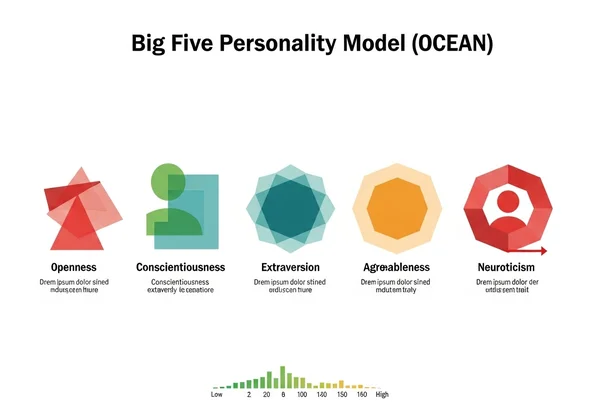Neuroticism Test: Understand Emotional Reactivity and What It Means
July 13, 2025 | By Alicia Campos
Have you ever felt overwhelmed by your emotions? Do you experience significant swings in mood or a heightened sense of worry? If you've asked yourself, "What is neuroticism?", you're embarking on a journey of self-discovery that many people share. This guide delves into neuroticism, a fundamental personality trait that profoundly influences how we experience and react to the world. We'll explore its definition, psychological roots, and common characteristics, helping you understand this aspect of yourself better. For those ready to explore their own emotional patterns, consider taking a free and insightful neuroticism test online.

Defining Neuroticism: More Than Just Being Emotional
In psychology, neuroticism is a nuanced trait, not just a label for being "emotional." It’s a core dimension of personality that reflects an individual's tendency to experience negative emotions such as anxiety, sadness, irritability, and vulnerability. Understanding this trait offers profound insights into one's emotional landscape.
What Neuroticism Truly Means in Psychology
Psychologically, neuroticism is defined as a stable personality trait that predisposes individuals to negative emotional states. It's not about being "weak" or "flawed"; rather, it's about a particular style of processing and reacting to life's stressors. Individuals high in this trait often perceive ordinary situations as threatening and minor frustrations as overwhelmingly difficult. It's a spectrum, and everyone falls somewhere along it.
Emotional Reactivity: The Core of the Trait
The heart of neuroticism lies in emotional reactivity. This means how quickly, intensely, and long you respond to emotional triggers. If you're someone high in neuroticism, you might react more strongly to a stressful event, experience prolonged emotional distress, and find it harder to return to an emotional baseline compared to someone low in this trait. This heightened reactivity can manifest in various ways, from frequent worrying to experiencing intense mood swings.
Common Misconceptions About Being "Neurotic"
The term "neurotic" has often been misused in casual conversation, sometimes implying irrationality or mental illness. It's important to remember that neuroticism is a personality trait, not a mental disorder. While a higher score can indicate a predisposition to conditions like anxiety or depression, it's not the same as having them. It's just one part of your unique personality puzzle, and our aim here is to clarify what this trait truly means.
Neuroticism in the Big Five Personality Traits
To truly grasp where neuroticism fits, we need to look at the widely accepted Big Five personality model. This model posits that personality can be largely described by five broad dimensions, and neuroticism is one of them.
The OCEAN Model: Where Neuroticism Fits In
The Big Five model, often remembered by the acronym OCEAN, includes Openness to Experience, Conscientiousness, Extraversion, Agreeableness, and Neuroticism. Each of these traits exists on a spectrum, and together they provide a comprehensive framework for understanding individual differences in personality. Big Five neuroticism specifically refers to the dimension of emotional stability versus instability. It measures a person's tendency to experience unpleasant emotions.

How Neuroticism Compares to Other Core Traits
While all five traits are distinct, they often interact. For instance, someone highly extraverted might channel their emotional reactivity differently than an introvert. Unlike agreeableness, which relates to cooperation, or conscientiousness, which relates to organization, neuroticism is primarily about emotional regulation and vulnerability to stress. Understanding these comparisons helps paint a fuller picture of an individual's personality profile. Explore your own traits with a comprehensive personality test for anxiety on our site.
Common Characteristics and Expressions of High Neuroticism
Individuals with a higher degree of neuroticism often exhibit specific patterns in their thoughts, feelings, and behaviors. Recognizing these characteristics can be a powerful step towards self-awareness and understanding.
Signs of Emotional Sensitivity and Volatility
People with high neuroticism are often characterized by significant emotional sensitivity. They might be easily upset by criticism, prone to feeling overwhelmed by small stressors, or react intensely to perceived threats. This can lead to rapid mood swings, where emotions shift quickly from one extreme to another. Imagine feeling a deep sadness one moment and intense irritation the next over something minor. This emotional volatility can sometimes make daily life feel like a rollercoaster.

Tendencies Towards Worry, Anxiety, and Self-Consciousness
A hallmark of high neuroticism is a pervasive tendency towards worry and anxiety. Individuals might spend a lot of time ruminating on past mistakes or anticipating future problems, often imagining worst-case scenarios. This can manifest as chronic generalized anxiety, social anxiety, or even panic attacks. Additionally, self-consciousness is common, leading to a strong concern about how they are perceived by others and a fear of judgment or rejection. This internal focus often translates to internal discomfort.
Real-Life Manifestations: How it Shows Up Daily
How does high neuroticism translate into everyday life? It might appear as difficulty coping with stress at work, leading to burnout. It could also show up in relationships, where emotional sensitivity leads to frequent arguments or misunderstandings. Individuals might be more prone to taking things personally, feeling insecure, or struggling with decision-making due to fear of failure. These neuroticism symptoms are not necessarily visible to everyone, but they significantly impact the individual's internal experience. Understanding these patterns is a first step toward managing them.
Understanding the Spectrum: From Low to High Emotional Stability
It's important to remember that neuroticism is a spectrum. Just as some individuals score high, others fall on the lower end, indicating greater emotional stability. Both ends of the spectrum have unique characteristics, strengths, and challenges.
What Low Neuroticism Looks Like: Traits of Resilience
Individuals with low neuroticism score are generally characterized by high emotional stability and resilience. They tend to remain calm under pressure, are less prone to mood swings, and bounce back quickly from setbacks. They are often optimistic, secure, and relaxed, approaching life's challenges with a steady demeanor. These individuals might be perceived as stoic or unflappable, embodying traits that many aspire to cultivate. They are less likely to experience intense worry or self-doubt, leading to a more consistent and positive outlook.
Strengths and Challenges Across the Neuroticism Spectrum
While high neuroticism presents challenges like increased stress and emotional vulnerability, it can also come with certain strengths, such as heightened empathy, a keen awareness of potential risks, and a drive for self-improvement. Conversely, while low neuroticism means greater emotional stability, it might also mean someone is less attuned to subtle emotional cues or potential threats. The goal is not to eliminate neuroticism but to understand where you stand on the spectrum and leverage your strengths while addressing potential challenges. An effective neuroticism assessment can illuminate your unique profile.

Embracing Self-Awareness: Your Next Steps
Understanding what is neuroticism is a crucial step towards greater self-awareness and personal growth. It's about recognizing your inherent emotional patterns not as flaws, but as unique aspects of your personality. This knowledge empowers you to develop strategies for managing challenges and enhancing your well-being.
Whether you're a self-explorer seeking deeper insights, a stressed professional looking to manage emotional reactions, or a psychology enthusiast eager for scientific validation, identifying your own level of emotional reactivity is invaluable. Our free online Neuroticism Test provides an accessible, scientifically-backed way to gain this clarity. It offers instant results and, optionally, an AI-powered personalized report with actionable advice tailored just for you.
Ready to embark on your journey of self-discovery? Visit our homepage today and start your test.
Frequently Asked Questions About Neuroticism
Here are some common questions we encounter about this important personality trait:
What is a neuroticism test?
A neuroticism test is a psychological assessment designed to measure an individual's level of neuroticism, a personality trait reflecting emotional stability versus instability. It typically involves a series of questions about emotional responses, mood fluctuations, and reactions to stress. Our free online neuroticism test provides a quick way to get your score and understand your emotional tendencies.
How do I know if I have neuroticism?
Everyone possesses some degree of neuroticism as it is a fundamental human trait. The question isn't "if" but "to what extent." If you frequently experience intense worry, anxiety, mood swings, self-consciousness, or find it hard to bounce back from stress, you might score higher on a neuroticism assessment. Taking a scientifically validated test, like the one available on our site, can provide objective insight into your personal level.
What does a high neuroticism score mean?
A high neuroticism score indicates a greater predisposition to experience negative emotions such as anxiety, sadness, anger, and irritability. It suggests a higher degree of emotional reactivity and vulnerability to stress. This doesn't mean something is "wrong" with you, but rather highlights a personality style that requires specific strategies for emotional well-being and personal growth.
Is neuroticism just anxiety?
No, neuroticism is not just anxiety, though anxiety is a significant component and common manifestation of high neuroticism. Neuroticism is a broader personality trait that encompasses a general predisposition to negative emotions, including worry, sadness, self-consciousness, and irritability, in addition to anxiety. While a person with high neuroticism may be prone to anxiety, the trait itself describes a wider range of emotional and psychological tendencies.
Can you fix or reduce neuroticism?
While neuroticism is considered a relatively stable personality trait, its impact and expressions can certainly be managed and reduced. You can't "fix" your inherent personality, but you can develop strategies to improve your emotional stability. Techniques like mindfulness, cognitive-behavioral therapy (CBT) principles, stress management, and self-awareness practices can significantly help in navigating the challenges associated with higher neuroticism. Understanding your score through a neuroticism assessment is the first empowering step toward personal development.